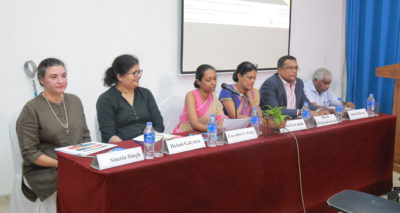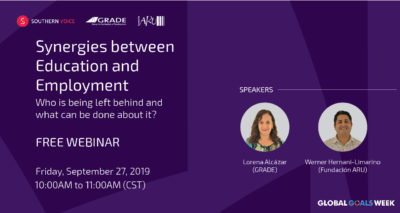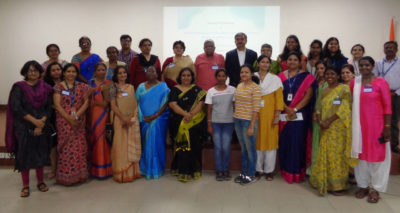Southern Voice will host its first General Assembly on 14 November 2018 in Bangkok, Thailand. Venue: Sigma (6th Floor), Pullman Bangkok…
For the first time, Southern Voice was a partner of Global Goals Week (GGW), which took place between 21-30 September 2019. Rather than organizing one big event in New York during those days and having our researchers fly in from all over the world, we organized five events on the Sustainable Development Goals (SDGs) in different countries of the Global South. They took place in Ghana, India, Nigeria, Sri Lanka and online (by teams in Peru and Bolivia). The panels covered three critical SDGs, namely SDG 4 (quality education), SDG 7 (affordable and clean energy) and SDG 8 (decent work and economic growth). By “staying local” and avoiding lengthy flights we also like to think that we contributed to SDG 13 (climate action).

On September 24, in Abuja-Nigeria, the Centre for the Study of the Economies of Africa (CSEA) presented the research findings of it’s “State of the SDGs” study, titled: Exclusion in Education in Nigeria: The dimensions, drivers and implications for the SDGs. The event provided a platform for experts and stakeholders in the education sector to share knowledge, propose more actionable policy recommendations, and ensure that government implements them. See pictures of the event here.
 Also on September 24, in Colombo-Sri Lanka, the Centre for Poverty Analysis (CEPA) organised the “Open Forum on Transformative or same-same? The 4th Industrial Revolution and jobs”. Karin Fernando, a Senior Researcher at CEPA, highlighted that “automation in the apparel sector affects different work segments differently. 70% of the apparel workforce that is low-skilled will face specific challenges, like monotonous job routines, work-stress and other related social issues, especially in the case of the migrant workforce”. Read more about it here.
Also on September 24, in Colombo-Sri Lanka, the Centre for Poverty Analysis (CEPA) organised the “Open Forum on Transformative or same-same? The 4th Industrial Revolution and jobs”. Karin Fernando, a Senior Researcher at CEPA, highlighted that “automation in the apparel sector affects different work segments differently. 70% of the apparel workforce that is low-skilled will face specific challenges, like monotonous job routines, work-stress and other related social issues, especially in the case of the migrant workforce”. Read more about it here.
 And on the same date, but in Accra – Ghana, the Institute of Statistical, Social and Economic Research (ISSER) held a dissemination workshop. The topic was “Ensuring Access to Affordable, Sustainable and Clean Household Energy for all in Ghana”. The programme was chaired by Dr Ama Pokuaa Fenny, a member of the SVSS research team in Ghana. Dr Aba Obrumah Crentsil, the lead researcher, presented the methodology and results of the study. In attendance were representatives from reputable institutions including the Energy Commission of Ghana (EC), Ministry of Planning (MoP), Regional Institute of Population Studies (RIPS), Ministry of Environment, Science and Technology (MEST), Institute of Environment and Sanitation Studies of the University of Ghana, ISSER, and Ph.D. and Master Students from the University of Ghana. More information here.
And on the same date, but in Accra – Ghana, the Institute of Statistical, Social and Economic Research (ISSER) held a dissemination workshop. The topic was “Ensuring Access to Affordable, Sustainable and Clean Household Energy for all in Ghana”. The programme was chaired by Dr Ama Pokuaa Fenny, a member of the SVSS research team in Ghana. Dr Aba Obrumah Crentsil, the lead researcher, presented the methodology and results of the study. In attendance were representatives from reputable institutions including the Energy Commission of Ghana (EC), Ministry of Planning (MoP), Regional Institute of Population Studies (RIPS), Ministry of Environment, Science and Technology (MEST), Institute of Environment and Sanitation Studies of the University of Ghana, ISSER, and Ph.D. and Master Students from the University of Ghana. More information here.
 Two events took place on September 27. One was a webinar by GRADE (Peru) and ARU Foundation (Bolivia). During one hour, participants had the chance to learn about “Synergies between Education and Employment: who is being left behind, and what can be done about it?”. Over forty people from all over the world signed up for the webinar. The presenters analysed what it means to be left behind in the workforce and in access to education and what needs to be done to make these two fields improve in outcomes. You can watch the webinar here or read about it here.
Two events took place on September 27. One was a webinar by GRADE (Peru) and ARU Foundation (Bolivia). During one hour, participants had the chance to learn about “Synergies between Education and Employment: who is being left behind, and what can be done about it?”. Over forty people from all over the world signed up for the webinar. The presenters analysed what it means to be left behind in the workforce and in access to education and what needs to be done to make these two fields improve in outcomes. You can watch the webinar here or read about it here.
 The other event was by the Public Affairs Centre India (PAC). They held a “National Workshop on India’s declining female labour force participation: Policy Implications and Relevance” in Bangalore. The goal was to discuss the causes for the decline, looking at India’s flagship skilling programmes as well as the shifting development narratives towards the SDGs (4, 5 and 8). Read a full summary here.
The other event was by the Public Affairs Centre India (PAC). They held a “National Workshop on India’s declining female labour force participation: Policy Implications and Relevance” in Bangalore. The goal was to discuss the causes for the decline, looking at India’s flagship skilling programmes as well as the shifting development narratives towards the SDGs (4, 5 and 8). Read a full summary here.
The six teams that participated are all part of our flagship initiative, the “State of the SDGs”. The programme identifies the left behind across various contexts in the Global South, reveals the complex relationships between SDGs, and explores global governance issues affecting SDG implementation at the national level.
The initiative is a unique and wonderful example of cooperation across continents and cultures. At the Southern Voice Secretariat, we feel confident that this was a good experience and that we would like to continue with the GGW partnership. We will encourage more members to take part in the next edition. Their expertise is highly needed and sought after in the development community, both at home and abroad.


